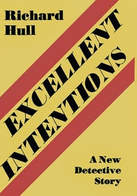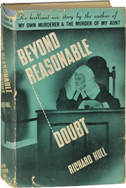
With 1938's highly enjoyable Excellent Intentions – published in the U.S. as Beyond Reasonable Doubt; the original title is more apt, if initially less criminous – the author presents a murder trial viewed from the perspective of multiple revolving participants, including defense counsel, prosecuting counsel, jury foreman, and judge. He also manages to keep the identity of the accused a secret for most of the book, which gives astute readers the chance to play detective.
Along the way, we are introduced to the suspects, including Macpherson, a rare stamp seller who was accused by Cargate of dishonesty; Raikes, Scotney End Hall's proper but harried personal butler; Miss Knox Forster, the dead man's personal assistant; and even Reverend Yockleton, who was not above the range of Cargate's animosity. Hardy, the caretaker, had been issued poison to eliminate a wasps' nest on the grounds, and it was this substance that had been ground and mixed with the contents of Cargate's snuff box.
While this story's shifting points of view could have created narrative problems, including a lack of cohesion and confusion over protagonists, the approach is actually quite successful. The longest chapter of the book focuses on Fenby's investigation and interviews of members of the household, and it is notably apparent that Hull is delivering the tone and plotting of classic Golden Age detective fiction while simultaneously satirizing the genre.
For one thing, the household is so wary of its misanthropic employer's penchant for accusing anyone of petty theft (while knowing the claim is a manufactured lie) that the servants have taken steps to elaborately alibi one another at all times. This practice works out handily when the prosecution wants to know who was in the dining room at what time, for instance. Study doors were also conveniently locked and witnessed to avoid the master of the house accusing the housemaids of mischief. Such timetable accuracy feels rather fanciful, but it is also the author's gently winking commentary on the artificiality of mystery stories. If a character is expected to die from taking poisonous snuff in a train carriage, then why not add the equally colorful conceit that the suspects have their comings and goings timed to the minute?
 Cover for Beyond Reasonable Doubt, the U.S. title.
Cover for Beyond Reasonable Doubt, the U.S. title. UPDATE: JJ at The Invisible Event has informed me that The British Library plans to reprint Excellent Intentions and The Murder of My Aunt in 2018, so watch for those releases, as both are very entertaining comic mysteries. The British Library's Crime Classics series, curated by Martin Edwards, continues to provide readers with opportunities to explore dozens of lesser-known and unjustly neglected authors, and nearly always the journey is worth taking.
 RSS Feed
RSS Feed